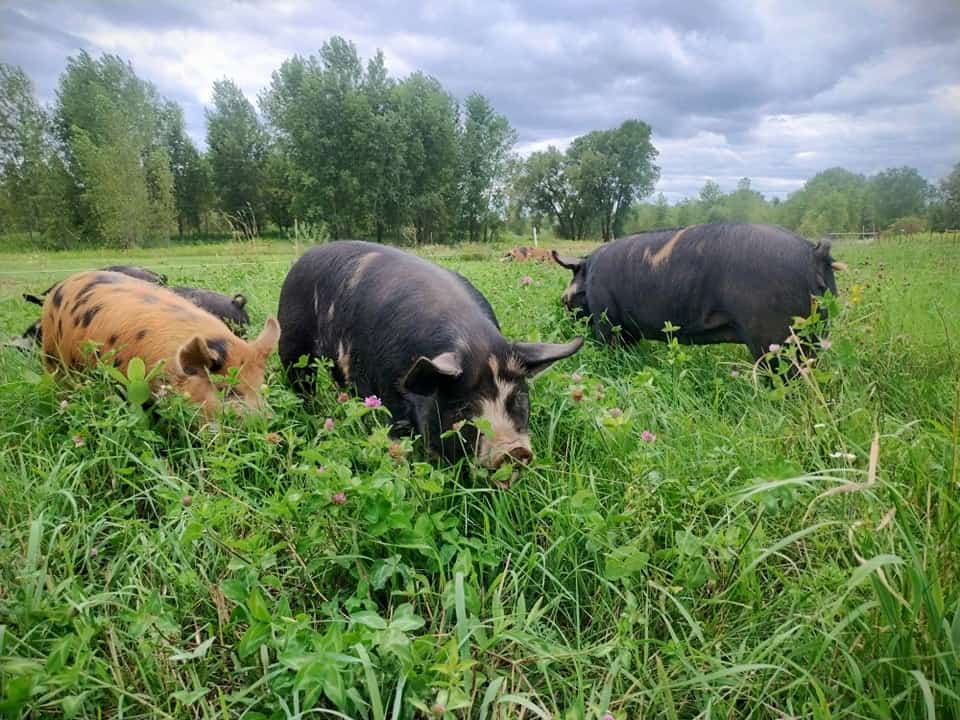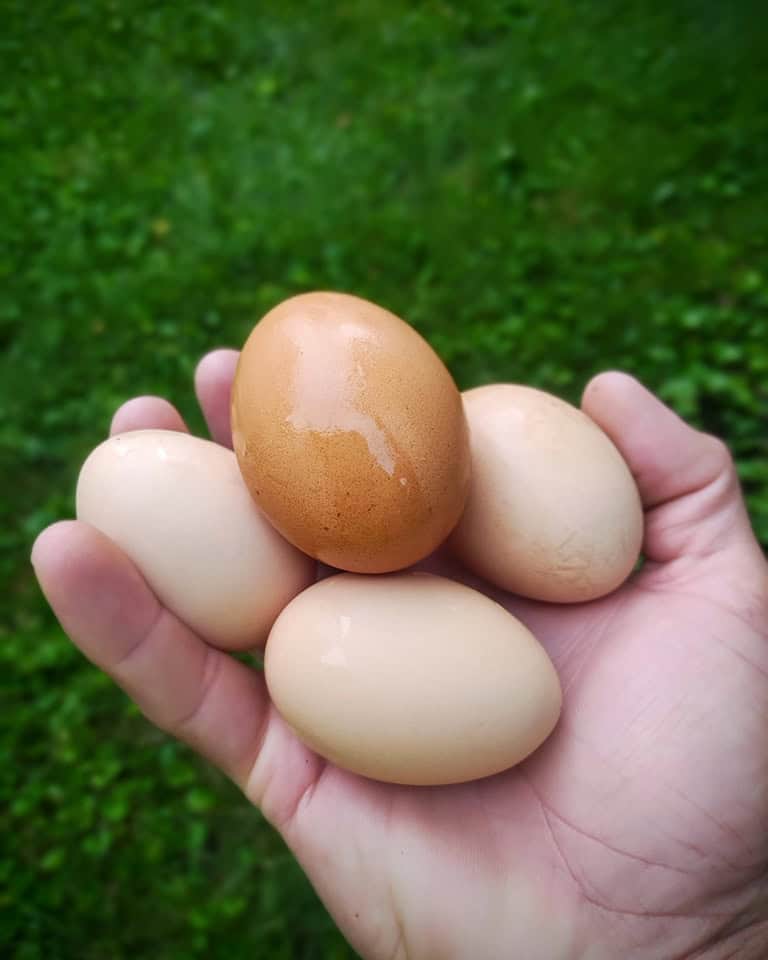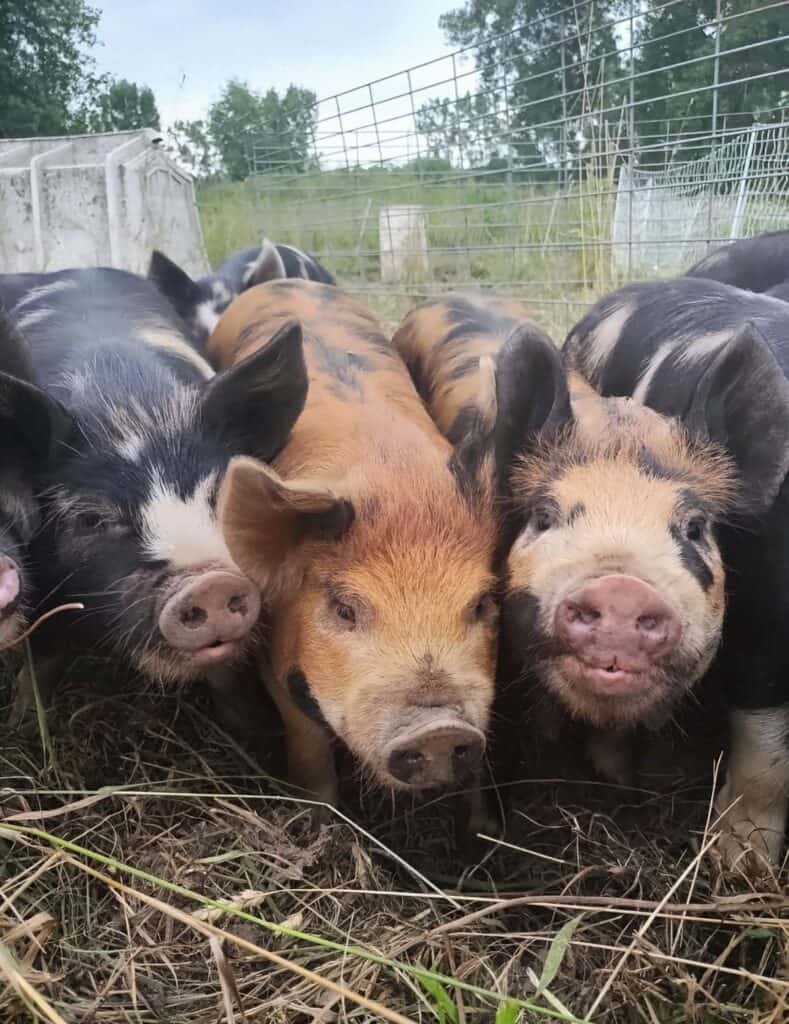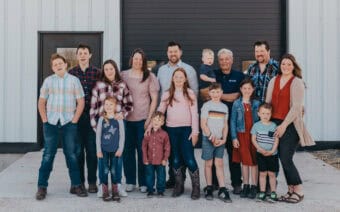
August 26, 2024
SLAB CITY – A shopping experience at a grocery store four-plus years ago, Nolan Marshall said, changed his and wife Nicole’s outlook on food – and set the trajectory for their future business, Slab City Farmstead.
“We pretty much started out of COVID-19,” he said. “We went to Woodman’s back before anything really shut down, but when there was that panic with everybody going to the grocery store.”
Nolan said they were looking to buy some pizzas to take home around 9 p.m., “and there was a line from the checkout to the back of the store.”
“(I was like), ‘I don’t know what’s going on, but we’re not doing this,’” he said.
As someone who grew up around chickens, and helped his mom with gardening and canning, Nolan said he and Nicole “jumped in head first” into the realm of homesteading in order to have their own food independence.
However, instead of starting with chickens, which Nolan said tend to be “the gateway animal in farming or homesteading,” the Marshalls said they started with a different farm animal.
“We went straight into pigs without really any idea of what we were doing,” he laughed. “Two years ago, we got some breeding stock pigs and then started to slowly grow that. It’s been interesting, just learning the ins and outs of breeding these animals and raising young ones.”
As time went on, Nolan said they did end up adding hens to the farm, and Silver Fox rabbits.
This year, Nolan said he and Nicole had reached a point where they wanted to try and “make this into something more than just for ourselves.”
The Marshall’s farm, which is located in the unincorporated community of Slab City in Shawano County – hence the name of the business – is currently five acres, which Nolan said allows them to do a variety of things.

He said four of the acres are a mix of fields and woods where the pigs are and a half acre is dedicated to a garden, with the other half becoming part of the garden next year.
“The garden was (originally) just to feed ourselves and our family, and now it’s gotten out of control, to the point where we now want to do something a little bit more,” he said.
The offerings
With Slab City Farmstead just planting its roots as a business, Nolan said he and Nicole will be starting by selling free-range pork.
By Sept. 26, he said the first group of meat will be ready for sale – which is available in whole or half portions.
“I bring them to the butcher and the customer pays me, then pays the butcher for the processing,” he said.
The goal, he said, is to get the pigs to a 250-pound live weight for butchering – which means roughly a 180-pound hanging weight.
The pigs are sold at $3 per pound at their hanging weight, plus a processing fee.
This, Nolan said, means half of a pig will cost anywhere between $400-$500, while a whole pig will go for $800-$900.
“The take home weight is 120-140 pounds per whole or 60-70 per half,” he said. “Again, that’s depending on size and how the customer chooses to get it processed.”
Nolan said he plans to start selling individual cuts as well – such as bacon, ham and sausage.
“We are currently working on getting a retail food license to sell individual cuts from either our home, farmers markets or other venues,” he said. “We plan on being ready to do that this winter.”
By February 2025, Nolan said 11 more pigs will go to the butcher.
“And then we have two sows that are due in October,” he said. “So that’s around 15-20 more piglets due in October.”
Grass-fed pork, Nolan said, not only tastes better than what someone would find in stores, but is also healthier overall.
“It’s higher in vitamins and nutrients because they’re taking (those) up from the ground, instead of just being fed a straight corn and soy mix, which is what most commercial hogs are fed,” he said. “(Grass-fed) pigs are not just getting pushed to grow as fast as they can, with antibiotics and other drugs and super high protein.”
When the pigs grow at a slower pace, Nolan said, it’s a lot more natural and cleaner.
The pigs are also rotated across the land every four to seven days, Nolan said, since doing so benefits both the pigs – as they’re getting enough nutrients – and keeps the soil healthier.
Sustainability
To raise the healthiest pigs possible for consumption, Nolan said it’s important to implement sustainable practices on the farm.
The Marshalls said for them, that means “building our farm while keeping our soil in mind.”
“We do a lot of cover crops and grazing the animals,” he said. “Right now, we have our pigs out on the pasture, and then the chickens follow behind the pigs to break the pest cycle for the pigs.”
Pigs, Nolan said, can be pretty rough on pasture, which is why Slab City Farmstead has Idaho Pasture pigs.
“(Idaho Pasture pigs) are bred to grow well on a forage-based diet with little grain,” he said. “Conventional pigs are typically raised on free access to feed, while ours get two to five pounds per day, depending on their size and the season. The rest of their nutrition they get from the pasture.”
Idaho Pasture pigs are also bred to have a flattened snout that points upwards, which Nolan said prevents them from rooting – or digging with their snouts.

“The first pigs we got completely tore up their pen within hours,” he said. “With our pigs now, we are able to better utilize our fields as a forage source while keeping the pasture healthy with the fertilization the pigs provide.”
Additionally, Nolan said he and Nicole planted around 300-400 trees in the fields to provide both shade for the animals, as well as a feed source.
“We’ve planted chestnut, hazelnut, honey locust and apple trees,” he said.
Future plans
Though Slab City Farmstead has just begun, Nolan said he and Nicole are already working on future ways to grow the business, such as adding pasture-raised meat chickens.
“That’s going to be for next spring,” he said.
Though they also plan to have a stand at farmers’ markets next season, Nolan said they plan to stay out of the produce side, since that is something “that’s pretty well done at farmers markets.”
Instead, he said they are thinking of doing a fall and winter CSA (community-supported agriculture) program because their garden has more storage-type crops, such as garlic.
“We would be mixing in some of our meat products (as well),” he said. “We’re pretty interested in doing that during holidays.”
For example, Nolan said he and Nicole would like to do turkeys for Thanksgiving next year, which would also include in-season vegetables, such as potatoes and squash.
To learn more about Slab City Farmstead, visit its Facebook page.
 New North named Accredited Economic Development Organization by IEDC
New North named Accredited Economic Development Organization by IEDC The future of sustainable energy looks to alternative materials
The future of sustainable energy looks to alternative materials






